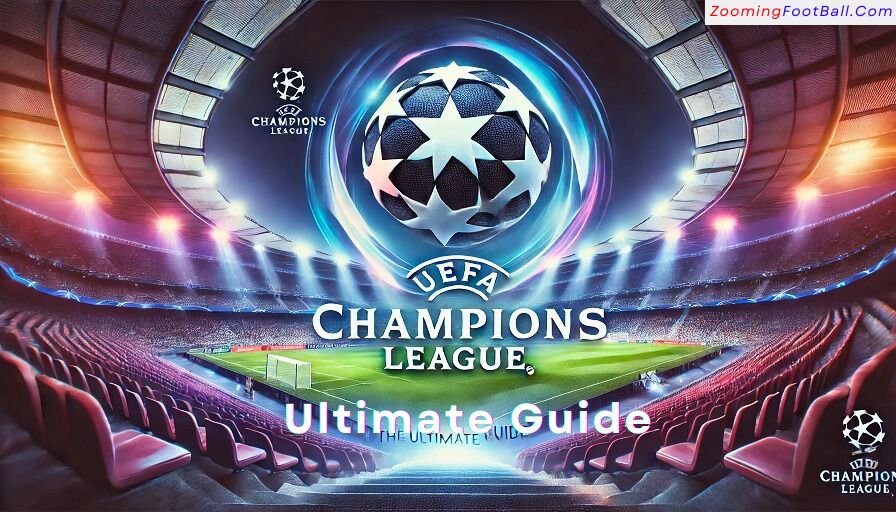Introduction to the UCL Soccer
Overview of the UCL Soccer
The UCL Soccer Champions League stands as the ultimate battleground for Europe’s top clubs, showcasing the finest talent from domestic leagues across the continent. Originally introduced as the European Cup in 1955, the competition underwent a major transformation in 1992, rebranding into the modern UCL era. Since then, it has evolved into the most-watched club tournament globally, second only to the FIFA World Cup, captivating millions of fans every season.
Throughout UCL history, the tournament has delivered iconic moments, from Real Madrid’s early dominance to thrilling finals featuring Manchester United, Bayern München, AC Milan, Barcelona, and Liverpool. Now, with the 2024/25 season introducing an expanded format, the competition will include 36 teams in the league phase, ensuring more intense matchups and higher stakes from start to finish.
One of the most thrilling aspects of the UCL is its knockout phase, where teams battle in two-legged ties to secure their place in the next round. The draw procedure follows strict UEFA regulations, with seeding pots ensuring fairness and balanced matchups. Teams qualify based on their domestic league performance, club coefficient rankings, and additional factors like the European Performance Spot, which rewards high-performing leagues.
At the heart of this legendary tournament stands the prestigious Champions League trophy, one of the most coveted prizes in soccer history. Any club that wins the competition three consecutive times or five times in total earns a replica trophy, cementing its legacy among football’s elite. Past winners include Juventus, Chelsea, Inter Milan, Borussia Dortmund, and Paris Saint-Germain, all of whom have left their mark on European Soccer history.
Importance and Global Impact: UCL Soccer
The UCL Soccer League is more than just a tournament—it embodies soccer heritage and serves as the ultimate stage for football legends. Over the years, icons like Cristiano Ronaldo, Lionel Messi, Karim Benzema, and Robert Lewandowski have shattered records, from all-time top scorer titles to most hat-tricks in a season. Meanwhile, rising stars like Erling Haaland and Kylian Mbappé continue to redefine the game, ensuring a bright future for European football.
Beyond its on-field brilliance, the UCL is a financial juggernaut. With billions in media rights, sponsorships, and solidarity payments, it fuels both elite clubs and underdog teams. Its global reach spans over 200 countries, making it one of the most-watched sporting events worldwide. Additionally, the tournament drives commercial expansion, boosts club valuations, and strengthens leagues like the Premier League, La Liga, Serie A, Bundesliga, and Ligue 1.
The UCL’s impact extends beyond finances, shaping football culture and infrastructure. Clubs invest heavily in stadium upgrades, youth academies, and UEFA licensing requirements to meet strict competition standards. The tournament’s match diversity also fosters thrilling encounters between historical powerhouses and emerging challengers, ensuring unmatched drama and unpredictability every season.
Comparison Table: UCL Soccer With Other Clubs Competitions
| Competition | Founded | Most Titles | Current Format | Teams | Annual Revenue |
| UEFA Champions League | 1955 | Real Madrid (14) | League Phase + Knockouts | 36 (2024/25) | $3.5 Billion |
| UEFA Europa League | 1971 | Sevilla (7) | Group Stage + Knockouts | 32 | $550 Million |
| UEFA Conference League | 2021 | Roma (1) | Group Stage + Knockouts | 32 | $235 Million |
| FIFA Club World Cup | 2000 | Real Madrid (5) | Knockout Format | 7 (2023), 32 (2025) | $500 Million |
As seen above, the Champions League outperforms other club competitions in revenue, prestige, and club achievements.
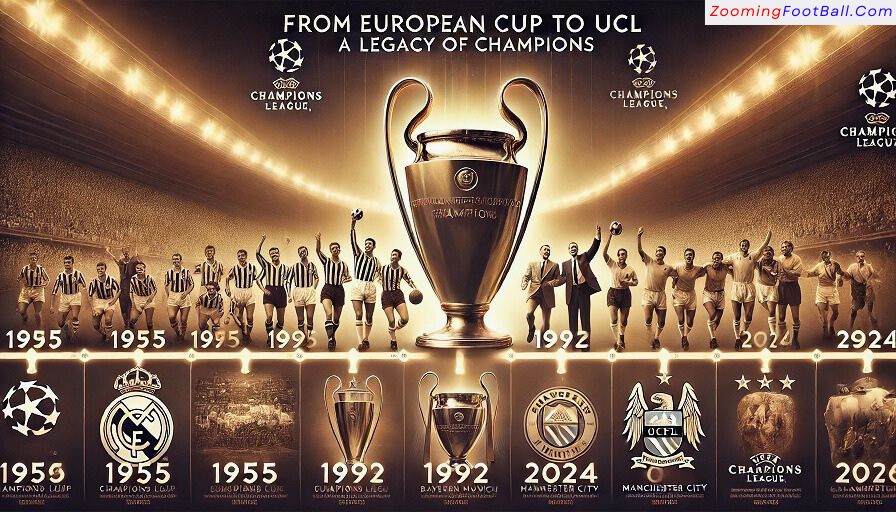
History of the UCL Soccer
Evolution from the European Cup to Today
The UEFA Champions League began as the European Cup in 1955, a knockout tournament featuring top clubs across Europe. Initially dominated by Real Madrid, the competition saw its first format change in 1992, rebranding as the Champions League with a group stage introduction.
Key transformations:
- 1955-1991 – Pure knockout format; only national champions participated.
- 1992-2003 – Introduction of a group stage, allowing multiple teams per country.
- 2003-2024 – Refinement of the qualification system, seeding, and increased team allocations.
- 2024/25 Onward – New league phase replacing group stages, expanding to 36 teams.
Evolution of the UCL Soccer
Here’s a timeline chart showcasing the Evolution of the UEFA Champions League from the European Cup to its current format:
| Year | Key Event |
| 1955 | European Cup founded with 16 teams |
| 1992 | Rebranded as UEFA Champions League |
| 1997 | Group stage introduced |
| 2003 | Knockout stage expanded |
| 2024 | New Swiss model league phase (36 teams) |
Milestone Moments and Iconic Matches
Some games have become part of soccer folklore:
- 1956 Final – Real Madrid wins the first-ever European Cup, beginning an era of dominance.
- 1960 Final – Real Madrid 7-3 Eintracht Frankfurt, still the highest-scoring final.
- 1999 Final – Manchester United scores twice in stoppage time to beat Bayern 2-1.
- 2005 Final – Liverpool’s ‘Miracle of Istanbul’, coming back from 3-0 down to beat Milan.
- 2012 Final – Chelsea wins its first title, defeating Bayern Munich on penalties.
- 2022 Final – Real Madrid clinches a record-extending 14th title, defeating Liverpool 1-0.
Most Successful Clubs and Nations in UCL Soccer
Some clubs have cemented their historical dominance:
| Club | Titles Won | Years Won |
| Real Madrid | 14 | 1956–2022 |
| AC Milan | 7 | 1963–2007 |
| Bayern Munich | 6 | 1974–2020 |
| Liverpool | 6 | 1977–2019 |
| Barcelona | 5 | 1992–2015 |
| Manchester United | 3 | 1968, 1999, 2008 |
By nation, Spain (19 titles), England (15 titles), and Italy (12 titles) lead the competition.
Legendary Players and Managers in UCL Soccer
Many soccer legends have left their mark:
- Cristiano Ronaldo – Most goals (140+), most UCL hat-tricks, most assists.
- Lionel Messi – Holds multiple records, including most group-stage goals.
- Zinedine Zidane – Led Real Madrid to three consecutive UCL titles as manager.
- Carlo Ancelotti – The only manager to win the Champions League four times.
- Pep Guardiola – Transformed Barcelona (2009, 2011) and Manchester City (2023) into European champions.
Chart: Legendary Players in UCL Soccer History
(A comparison of top scorers, most assists, and appearances)
| Player | Goals | Assists | Appearances |
| Cristiano Ronaldo | 140 | 42 | 183 |
| Lionel Messi | 129 | 40 | 163 |
| Robert Lewandowski | 92 | 25 | 114 |
| Karim Benzema | 90 | 28 | 152 |
| Raúl González | 71 | 25 | 142 |
Classic Wembley Goals and Historic Performances
Wembley Stadium has hosted several memorable finals:
- 1968 Final – Manchester United’s first UCL title, defeating Benfica 4-1.
- 1992 Final – Barcelona wins its first-ever Champions League, Koeman’s free-kick sealing the win.
- 2011 Final – Barcelona’s tiki-taka dominance, defeating Manchester United 3-1.
With Wembley set to host the 2024 final, another chapter of soccer history is about to unfold.
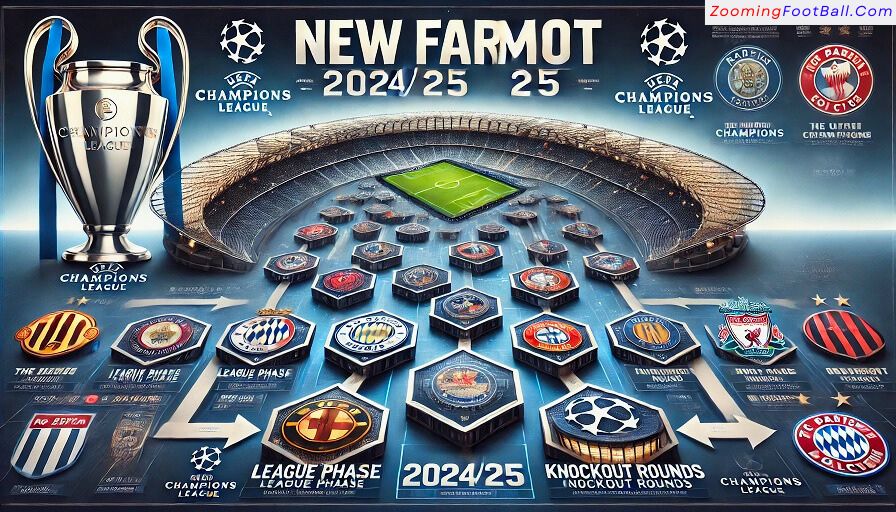
UCL Soccer Format & Competition System
The UEFA Champions League features a structured format, ensuring top European clubs compete for the biggest prize in club soccer. The tournament consists of three main phases: Qualification, the League Phase, and the Knockout Stage.
How the UCL Soccer Tournament Works
- Qualification Rounds (June – August): Clubs enter based on their domestic league performance.
- League Phase (September – January): A 36-team single-league format replaces the traditional group stage.
- Knockout Phase (February – May): The top teams advance to compete in two-legged knockout ties, culminating in a final at a neutral venue.
League Phase and Knockout Phase Explained
League Phase (Swiss Model – New 2024/25 Format)
The Swiss Model replaces the previous group stage format with a single league table of 36 teams, where each team plays 8 matches against different opponents.
📊 New League Phase Structure:
| Feature | Old Format (Until 2023/24) | New Swiss Model (From 2024/25) |
| Total Teams | 32 (8 groups of 4) | 36 (single league) |
| Matches per Team | 6 | 8 |
| Opponents | 3 | 8 |
| Advancement | Top 2 per group advance | Top 8 advance automatically, 9-24 enter playoffs |
Top 8 teams qualify for the Round of 16 automatically.
Teams ranked 9-24 enter a two-legged playoff for the remaining spots.
Teams ranked 25-36 are eliminated from Europe.
Knockout Phase (Round of 16 – Final)
Once the 16 best teams are determined, the traditional knockout format begins:
1️⃣ Round of 16: Two-legged ties (home & away).
2️⃣ Quarter-Finals & Semi-Finals: Two-legged matchups.
3️⃣ Final: A single-match showdown at a neutral venue.
Qualification Process: How Teams Get In
Teams qualify for the UCL Soccer based on domestic league performance and UEFA’s coefficient rankings.
📌 Entry Paths:
| Entry Route | Number of Teams |
| Top 4 leagues (ENG, ESP, ITA, GER) | 4 (Possibly 5 with new coefficient spots) |
| France | 3 |
| Other top leagues | 2-3 |
| Champions Path (Domestic Winners) | Varies |
| League Path (Non-Champions) | Varies |
| Extra UEFA Performance Spots | 2 |
🔹 Two additional teams qualify based on the best-performing leagues in the previous UEFA season.
🔹 Champions of lower-ranked leagues enter through the Champions Path playoffs.
New Format Post-2024: Swiss Model Changes
🔄 UCL Soccer introduced the Swiss Model to create:
✅ More matches between Europe’s elite clubs.
🔮 A fairer and more competitive structure.
✅ A more lucrative broadcasting model.
📊 Comparison of Old vs. New Format:
| Aspect | Old Format | New Format (2024/25) |
| Total Teams | 32 | 36 |
| Groups | 8 (of 4 teams) | 1 League Table |
| Total Matches | 125 | 189 |
| Group Stage Games Per Team | 6 | 8 |
🚀 Bigger Competition = More Money + More Elite Matchups
Prize Money and Rewards in UCL Soccer
The UCL Soccer is Europe’s most lucrative club competition, with clubs earning from participation, victories, and broadcast deals.
💰 2024/25 Champions League Prize Breakdown:
| Stage | Prize Money (€ Million) |
| League Phase Qualification | 15.64 |
| Win Bonus (Per Match) | 2.8 |
| Draw Bonus (Per Match) | 0.93 |
| Round of 16 | 9.6 |
| Quarter-Finals | 10.6 |
| Semi-Finals | 12.5 |
| Finalist | 15.5 |
| Winner | 20.0 |
Here’s the Prize Money Distribution Bar Chart for the 2024/25 UEFA Champions League. Let me know if you need more visuals, such as a flowchart for qualification or a Swiss model comparison.
📌 Additional Revenue Sources:
- Broadcasting Rights 📺 (Multi-billion deals).
- Market Pool Payments 💵 (Based on TV market size).
- UEFA Sponsorship Deals 🏆 (Adidas, Heineken, Mastercard, etc.).
2024/25 UCL Soccer Season
The 2024/25 UEFA Champions League marks a historic shift with the introduction of the Swiss model, expanding the league phase and increasing the number of matches.
Association Team Allocation and Rankings in UCL Soccer
The Champions League spots are allocated based on UEFA’s coefficient rankings, rewarding top-performing leagues with more qualification slots.
| Country | Number of Teams | Qualification Path |
| England 🇬🇧 | 4 (Possibly 5) | Top 4 in Premier League (+ 1 extra for top-ranked leagues) |
| Spain 🇪🇸 | 4 (Possibly 5) | La Liga’s best teams |
| Germany 🇩🇪 | 4 (Possibly 5) | Bundesliga’s top finishers |
| Italy 🇮🇹 | 4 (Possibly 5) | Serie A’s top-ranked clubs |
| France 🇫🇷 | 3 | Ligue 1’s leading teams |
| Other Leagues 🌍 | Various | Champions Path & League Path qualifiers |
🔹 Two extra spots awarded to leagues with the best UEFA performances in 2023/24.
🔹 One additional place for the Champions Path qualifiers.
Key Match and Draw Dates
📅 Important Dates for the 2024/25 UCL
| Event | Date |
| Qualification Rounds | June–August 2024 |
| League Phase Draw | August 29, 2024 |
| League Phase Matches | September–December 2024 |
| Knockout Round Draw | January 2025 |
| Final | May 31, 2025 |
🏟 Final Venue: Munich Soccer Arena (Allianz Arena), Germany
Qualification Rounds Breakdown
🔹 Four rounds of qualification determine the final four spots in the 36-team league phase.
🔹 Two paths:
- Champions Path: National league winners from lower-ranked nations compete.
- League Path: High-placed teams from stronger leagues fight for entry.
| Round | Teams Entering | Winners Advance To |
| Preliminary Round | Domestic champions from minor leagues | First Qualifying Round |
| First Qualifying Round | Champions from mid-tier leagues | Second Qualifying Round |
| Second Qualifying Round | Stronger league champions, League Path teams | Third Qualifying Round |
| Third Qualifying Round | High-ranking non-champions enter | Play-Off Round |
| Play-Off Round | Final battle for UCL spots | League Phase |
League Phase: Table, Results, Schedule
New Format: One 36-team league instead of groups.
Each team plays 8 matches (4 home, 4 away).
No fixed groups, increasing competitive balance.
| Position | Outcome |
| 1st-8th | Direct qualification to Round of 16 |
| 9th-24th | Enters play-offs for knockout spots |
| 25th-36th | Eliminated from Europe |
📌 The top teams will have more elite matchups, making the race for knockout qualification more intense!
Knockout Phase: Play-Offs, Bracket, Final
🔹 Play-Offs: 9th-24th place teams compete in two-legged ties for Round of 16 spots.
🔹 Traditional Knockout Stage:
- Round of 16 → Quarter-Finals → Semi-Finals → Final
- Two-legged ties until the one-match final.
🏆 Final: May 31, 2025, at Munich Football Arena
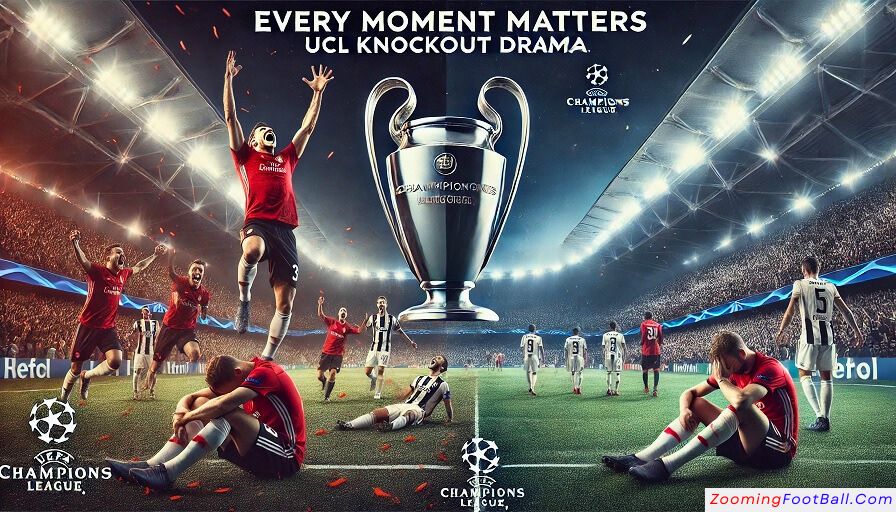
UCL Soccer League Knockout Phase Play-Off Draw
The knockout phase play-offs are a new addition to the Champions League format, introduced in the 2024/25 season. This round determines the final eight teams that qualify for the Round of 16.
What Are the Knockout Phase Play-Offs?
- The 9th to 24th placed teams from the league phase enter a two-legged knockout play-off round.
- The eight winners move on to the Round of 16, joining the top eight automatically qualified teams.
- The eight losers are eliminated from the competition.
📌 Why the Change?
- More competitive balance in the knockout stages.
- Keeps the league phase exciting until the final matchdays.
- Increases match revenue and broadcasting value.
Teams Involved and Draw Details
The Knockout Play-Off Draw consists of:
✅ 16 teams (9th–24th place finishers) from the league phase.
🔮 Two-legged ties (home and away) decide the winners.
🏆 Top-ranked teams (9th–16th place) are seeded and face lower-ranked teams (17th–24th).
📊 Example Play-Off Draw Structure:
| Seeded Team (9th-16th Place) | Unseeded Team (17th-24th Place) |
| Chelsea 🇬🇧 | Sporting CP 🇵🇹 |
| AC Milan 🇮🇹 | Celtic 🇬🇧 |
| Atlético Madrid 🇪🇸 | Shakhtar Donetsk 🇺🇦 |
| Dortmund 🇩🇪 | Feyenoord 🇳🇱 |
🏆 Winners advance to the Round of 16, while losers are eliminated from European competition.
Draw Rules: Same National Association Restrictions?
✅ No restrictions on teams from the same country—clubs from the same league (Premier League, La Liga, etc.) can face each other in the play-offs.
🔮 Teams cannot face opponents they played in the league phase.
🏆 The higher-ranked team plays the second leg at home.
Key Match Dates and Format Changes
📅 2024/25 Knockout Play-Off Round Schedule:
| Stage | Date |
| Knockout Play-Off Draw | February 2025 |
| First Leg Matches | February 18-19, 2025 |
| Second Leg Matches | February 25-26, 2025 |
| Round of 16 Draw | March 2025 |
📌 Format Changes from Previous Seasons:
✔ No more group-stage runner-ups vs. group winners.
🔮 Knockout play-offs replace the traditional Round of 16 qualification process.
✔ More teams have a second chance to qualify for the knockouts.
2025 & 2026 UCL Soccer League Finals
The UEFA Champions League finals in 2025 and 2026 will be played at two iconic venues, marking historic moments for European Soccer.
2025 Final: Munich Football Arena History
📍 Venue: Munich Football Arena (Allianz Arena) 🇩🇪
📅 Final Date: May 31, 2025
The Munich Football Arena, home of Bayern Munich, is one of the most famous soccer stadiums in Europe.
🏟 Key Facts About the Stadium:
- Opened: 2005
- Capacity: 75,000
- Hosted the 2012 UCL Final (Chelsea 🏆 vs. Bayern Munich)
- EURO 2024 Venue
🔹 The last UCL final here in 2012 ended in Chelsea’s dramatic victory over Bayern Munich, decided by a penalty shootout after Didier Drogba’s legendary equalizer.
Where is the 2026 Final of ?
📍 Venue: Puskás Aréna, Budapest 🇭🇺
📅 Final Date: May 30, 2026
The 2026 UEFA Champions League Final will take place in Hungary’s capital, Budapest, at the modern Puskás Aréna.
🏟 Key Facts About the Stadium:
- Opened: 2019
- Capacity: 67,215
- Named after Hungarian legend Ferenc Puskás
- Hosted the 2023 UEFA Europa League Final
🔹 This will be the first-ever Champions League final in Hungary, bringing the biggest stage of European soccer to a rising soccer nation.
Past Memorable Final Moments of UCL Soccer League
The Champions League final has delivered some of the most unforgettable moments in soccer history:
| Year | Match | Key Moment |
| 1999 | Manchester United 🆚 Bayern Munich | United’s 2 goals in injury time to win 2-1 🏆 |
| 2005 | AC Milan 🆚 Liverpool | “Miracle of Istanbul” – Liverpool’s comeback from 3-0 down |
| 2014 | Real Madrid 🆚 Atlético Madrid | Sergio Ramos’ 93rd-minute equalizer led to a 4-1 win |
| 2018 | Real Madrid 🆚 Liverpool | Gareth Bale’s stunning bicycle kick goal 🚀 |
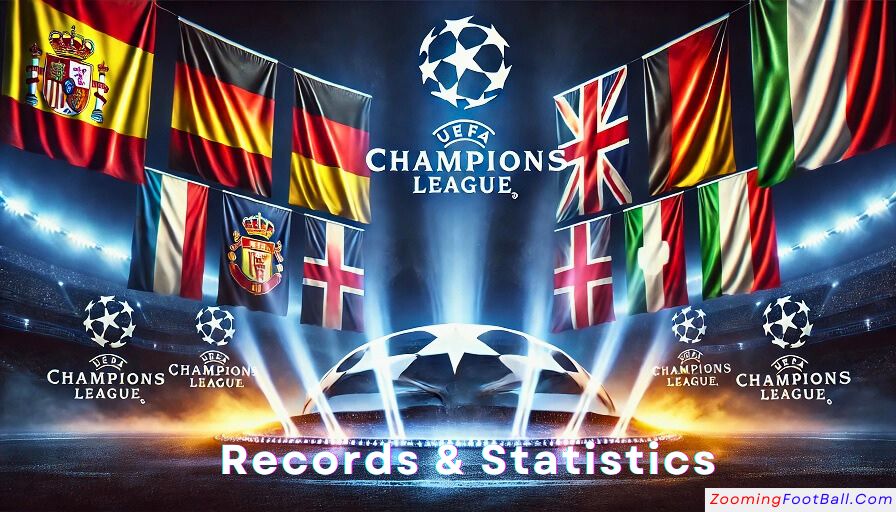
UCL Soccer League Records & Statistics
The UEFA Champions League has produced historic moments, legendary players, and dominant clubs. Below are the key records and statistics that define the competition.
All-Time Top Scorers
| Player | Goals | Matches | Clubs Represented |
| Cristiano Ronaldo | 140 | 183 | Man United, Real Madrid, Juventus |
| Lionel Messi | 129 | 163 | Barcelona, PSG |
| Robert Lewandowski | 91 | 111 | Dortmund, Bayern, Barcelona |
| Karim Benzema | 90 | 152 | Lyon, Real Madrid |
👉 Ronaldo holds the record for most goals and hat-tricks (8) in Champions League history.
👉 Messi has the most goals for a single club (Barcelona – 120).
Most Appearances in UCL Soccer League History
| Player | Matches Played | Clubs |
| Cristiano Ronaldo | 183 | Man United, Real Madrid, Juventus |
| Iker Casillas | 177 | Real Madrid, Porto |
| Thomas Müller | 147 | Bayern Munich |
| Karim Benzema | 149 | Lyon, Real Madrid |
🏆 Ronaldo holds the record for most wins (115 matches).
🧤 Casillas has the most appearances for a goalkeeper (177 games).
Best Final Performances in UCL Soccer League History
- Zinedine Zidane (2002 Final – Real Madrid vs. Bayer Leverkusen) 🏅
- Scored an iconic left-footed volley to seal Real Madrid’s 9th title.
- Steven Gerrard (2005 Final – Liverpool vs. AC Milan) 🚀
- Inspired Liverpool’s comeback from 3-0 down to win in Istanbul.
- Cristiano Ronaldo (2017 Final – Real Madrid vs. Juventus) ⚽
- Scored twice in a dominant 4-1 victory.
- Didier Drogba (2012 Final – Chelsea vs. Bayern Munich) 🔥
- Equalized in the 88th minute and scored the winning penalty in the shootout.
Clubs with the Most Titles UCL Soccer League
| Club | Titles Won | Most Recent Victory |
| Real Madrid | 14 | 2022 |
| AC Milan | 7 | 2007 |
| Bayern Munich | 6 | 2020 |
| Liverpool | 6 | 2019 |
| Barcelona | 5 | 2015 |
⚡ Real Madrid remains the most dominant club with 14 titles—including five straight from 1956-1960 and a historic three-peat (2016-2018).
Performance by Clubs & Nations in UCL Soccer League
📊 Most Successful Nations (Total Titles by Country):
| Country | Total Titles | Top Clubs |
| Spain | 19 | Real Madrid (14), Barcelona (5) |
| England | 15 | Liverpool (6), Man United (3) |
| Italy | 12 | AC Milan (7), Inter (3) |
| Germany | 8 | Bayern Munich (6), Dortmund (1) |
All-Time Stats & Rankings
- Most Goals in a UCL Season: Cristiano Ronaldo – 17 (2013/14).
- Most Assists in UCL History: Cristiano Ronaldo – 42 assists.
- Biggest UCL Final Win: AC Milan 4-0 Barcelona (1994).
- Fastest Hat-Trick: Bafétimbi Gomis (Lyon) – 8 minutes (2011).
The UCL Soccer Champions League remains the pinnacle of club soccer, setting records, milestones, and unforgettable moments every season! 🚀🔥
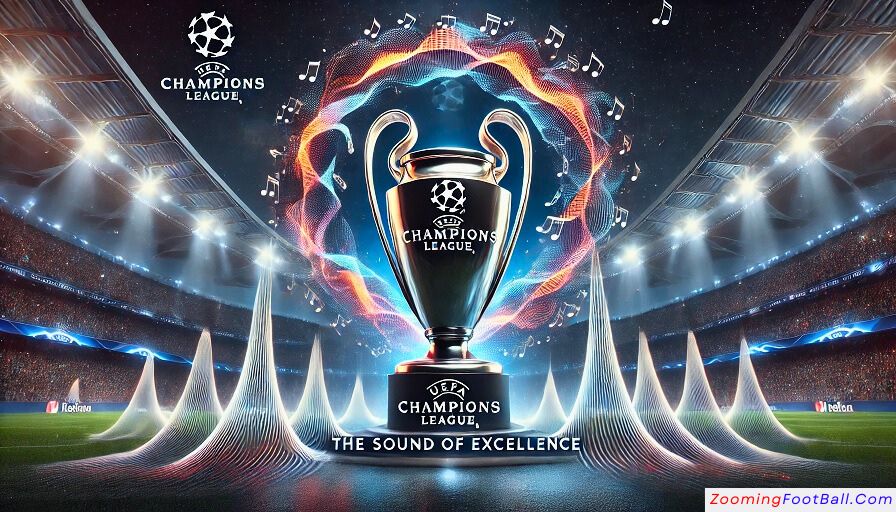
UCL Soccer Champions League Trophy & Anthem
History and Significance of the Trophy
The UEFA Champions League trophy is one of the most recognizable prizes in soccer. Known as the “Big Ears” due to its distinctive handle shape, the trophy symbolizes European club supremacy.
- The original European Cup was first awarded in 1956, with Real Madrid being the first winner.
- Since 1967, UEFA has kept the original and awards a replica to winners.
- Clubs that win the tournament five times or three consecutive seasons earn the right to keep a full-size replica.
Lyrics Facts: About the UCL Soccer Champions League Anthem
The UEFA Champions League Anthem, composed by Tony Britten in 1992, is adapted from George Frideric Handel’s “Zadok the Priest”.
Lyrics (translated from Latin, French, and German):
“These are the best teams, the great teams, the champions…”
“They are the best! They are the best!”
- Played before every match, the anthem instantly raises excitement in stadiums.
- The full version is rarely heard live—only the chorus is played before kick-off.
What Players Say About the Anthem
- Cristiano Ronaldo: “Hearing the anthem gives me goosebumps every time.”
- Lionel Messi: “The moment it plays, you know you’re in the biggest competition in football.”
- Sergio Ramos: “It’s a special melody that represents history and legacy.”
The anthem is more than just a song—it’s a symbol of elite soccer, drama, and unforgettable moments.
Sponsorship, Media Coverage & Branding of UCL Soccer
Broadcasting Rights and Global Reach
The UEFA Champions League is one of the most-watched sporting events worldwide, with over 400 million viewers per season. Broadcasting rights are sold to regional networks and streaming platforms, ensuring global accessibility.
- Top Broadcasters (2024-27 cycle):
- United States: CBS Sports, Paramount+
- United Kingdom: TNT Sports
- Europe: DAZN, Canal+, Movistar+
- Asia & Middle East: beIN Sports, Sony Sports
- Latin America: ESPN, Star+
| Region | Key Broadcaster | Streaming Platform |
| USA | CBS Sports | Paramount+ |
| UK | TNT Sports | Discovery+ |
| Germany | DAZN, Amazon Prime | DAZN, Prime Video |
| Middle East | beIN Sports | beIN Connect |
| India | Sony Sports | SonyLIV |
UCL Soccer league Sponsorship Deals
UEFA secures multi-billion dollar sponsorship deals from leading global brands. The 2024/25 season sponsors include:
- Heineken (Beer Partner)
- Mastercard (Official Payments Sponsor)
- PepsiCo (Beverages & Snacks)
- Adidas (Match Ball & Kit Supplier)
- PlayStation (Gaming & Digital Content)
These deals generate over €3 billion annually, funding prize money, grassroots programs, and tournament development.
Evolution of Branding and Visual Identity
The Champions League branding has evolved since 1992, incorporating:
- Iconic “Starball” logo, representing European unity.
- Consistent blue-and-white color themes for a premium feel.
- Revamped broadcast graphics (2024/25 season) for digital-friendly viewing.
- Augmented reality (AR) and virtual ads, enhancing fan engagement.
The Champions League’s brand blends tradition with innovation, ensuring it remains soccer’s most prestigious club competition.
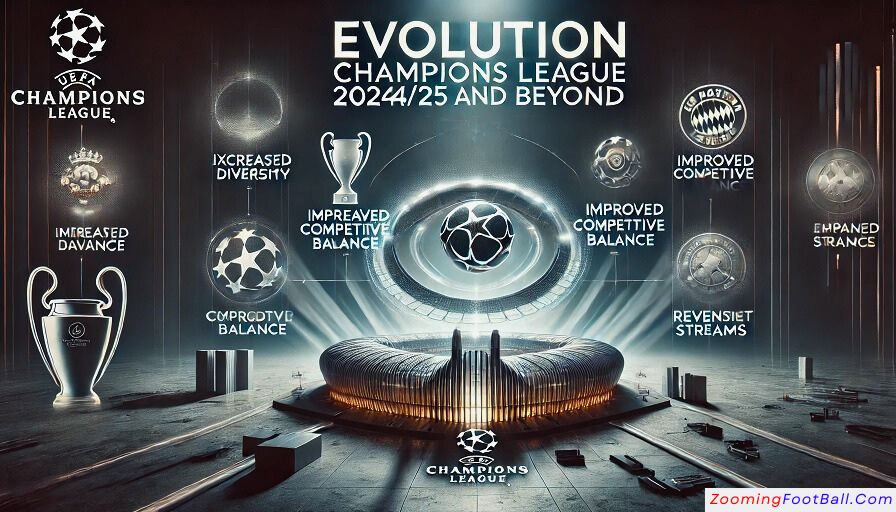
Impact of the New UCL Soccer Champions League Format
How Will It Benefit Fans?
The 2024/25 Champions League format introduces the Swiss model, replacing the traditional group stage. Key benefits for fans include:
✅ More Matches – 189 games instead of 125, ensuring more high-stakes action.
🔮 Bigger Clashes Earlier – No fixed groups; top clubs face varied opponents.
✅ Fairer Competition – League-style ranking determines knockout qualification.
📊 Match Increase Breakdown:
| Stage | Old Format Matches | New Format Matches |
| Group Stage | 96 | 144 |
| Knockouts | 29 | 45 |
| Total Matches | 125 | 189 |
Changes for European Competitions
The format directly impacts UEFA’s other tournaments:
- Champions League (CL): Expands from 32 to 36 teams.
- Europa League (EL): Adopts a similar league phase, replacing groups.
- Conference League (ECL): Also follows the league format, increasing competitiveness.
Implications for Domestic Leagues & Club Coefficients
- Top-performing leagues may get an extra Champions League spot.
- Increased fixture congestion for clubs in multiple competitions.
- Smaller leagues have higher qualification chances but must adapt to new scheduling.
📊 Potential Extra CL Spots Based on Coefficient Rankings:
| League | Current UCL Spots | New Max Spots (2024/25) |
| Premier League (England) | 4 | 5 |
| La Liga (Spain) | 4 | 5 |
| Bundesliga (Germany) | 4 | 5 |
| Serie A (Italy) | 4 | 5 |
| Ligue 1 (France) | 3 | 4 |
Will the Europa League & Conference League Formats Change?
Yes. Both competitions will mirror the Champions League’s Swiss model, with:
✅ 36 Teams in a Single League Table
🔮 8 Matches Per Team (Europa League), 6 for Conference League
✅ Expanded Knockout Phase
This ensures greater competition and more high-profile matchups, elevating the quality of European Soccer.
Future of the UCL Soccer Champions League (2025/26 and Beyond)
2025/26 Season Key Details: Dates, Draws & Final
The 2025/26 Champions League will continue with the Swiss model, refining its structure after the first season under the new format.
📅 Expected Key Dates:
| Stage | Expected Date (2025/26) |
| Qualification Rounds | June – August 2025 |
| League Phase Draw | August 2025 |
| League Phase Matches | September – January 2026 |
| Knockout Draw | February 2026 |
| Final | May 2026 |
🏟️ 2026 Final Venue: Puskás Aréna, Budapest (Hosting its first-ever UCL final).
How Will Qualifying Work in 2025/26 UCL Soccer League?
Qualification remains largely the same but will adapt based on the success of the 2024/25 format.
📊 Projected Champions League Spots Allocation:
| Pathway | Teams Qualified |
| Domestic League Finish | 24-26 teams |
| UEFA Coefficient Extra Spots | 2-4 teams |
| Champions Path (Qualifiers) | 4-6 teams |
| League Path (Qualifiers) | 2-4 teams |
- Top leagues (England, Spain, Germany, Italy) could gain extra spots based on performance.
- More competitive Champions Path ensures smaller clubs still have access.
Predictions & Potential Changes Ahead
🔮 Possible Adjustments for the Future:
- Expanded knockout phase – UEFA may tweak the playoff system for better balance.
- More teams? – If the format is successful, the UCL could grow beyond 36 clubs.
- Globalization trends – Could we see non-European clubs entering via an expanded Club World Cup partnership?
The Swiss model is just the start, and UEFA is likely to refine the system for better competitiveness, increased revenue, and greater fan engagement.
Unbelievable, Interesting & Amazing Fun Facts: UCL Soccer
Cristiano Ronaldo Holds Nearly Every Champions League Record
Cristiano Ronaldo is the all-time top scorer (140 goals), has the most appearances (183 matches), and is the only player to score in three finals. His dominance in Champions League history remains unmatched.
Real Madrid Won the First-Ever Champions League
In 1956, Real Madrid defeated Stade de Reims 4-3 to win the first European Cup. They went on to win the first five editions consecutively!
Lionel Messi and Ronaldo Both Scored Five Goals in a Single Match
Only Lionel Messi (vs. Bayer Leverkusen, 2012) and Cristiano Ronaldo (vs. Malmö, 2015) have scored five goals in a single Champions League match!
Only One Club Has Won the Treble Twice
Barcelona (2009 & 2015) is the only club to win the treble (league, domestic cup, and Champions League) twice.
Fastest Goal in Champions League History Took Just 10.12 Seconds
Roy Makaay scored in just 10.12 seconds for Bayern Munich against Real Madrid in 2007, setting the record for the fastest goal ever in the competition!
The UCL Soccer Champions League Trophy Weighs More Than a Bowling Ball
The iconic Champions League trophy weighs 7.5 kg (16.5 lbs), making it heavier than most bowling balls used in professional tournaments.
Only One Team Won the UCL Soccer Champions League Without Losing a Match
Manchester United (1998/99), Barcelona (2005/06), and Bayern Munich (2019/20) are the only teams to win the Champions League unbeaten!
Arsenal Holds the Record for Most Consecutive Clean Sheets
In 2005/06, Arsenal kept 10 consecutive clean sheets, setting a record for the longest defensive streak in the tournament’s history.
The UCL Soccer Champions League Final Is One of the Most-Watched Sporting Events
With an audience of over 380 million viewers, the Champions League Final ranks among the most-watched sporting events globally, surpassing even the Super Bowl in international viewership.
A Goalkeeper Once Won the UCL Soccer Champions League Golden Boot
In the 1959/60 season, José Álvarez, a goalkeeper for Real Madrid, finished as a joint top scorer with 7 goals after being used as an emergency striker!
The Only UCL Soccer Champions League Final Decided by a Golden Goal
The 2000 final between Real Madrid and Valencia remains the only final decided by a golden goal, when Zinedine Zidane’s stunning volley secured the title.
No Club Has Ever Won the UCL Soccer Champions League Three Times in a Row—Except Real Madrid
Real Madrid achieved the impossible by winning the Champions League three consecutive times (2016, 2017, 2018) under Zinedine Zidane—a record no other team has matched in the modern era.
The Champions League is filled with unbelievable moments, shocking records, and legendary performances, making it the greatest club competition in Soccer history!
FAQs: Everything You Need to Know About the UCL Soccer
What is the UCL Soccer League?
The UEFA Champions League is Europe’s most prestigious club competition, featuring top teams from across the continent competing for the ultimate title in European Soccer.
How does the UCL Soccer League format work?
The tournament consists of three phases: Qualification Rounds, League Phase, and Knockout Stage. From 2024/25, a new Swiss model replaces the group stage, where 36 teams compete in a single league before progressing to the knockout rounds.
What are the changes in the 2024/25 UCL Soccer Champions League season?
UEFA introduced the Swiss model, increasing the number of teams from 32 to 36 and eliminating traditional groups. Each team plays eight different opponents, with the top eight teams advancing directly to the Round of 16, while teams ranked 9th-24th enter the play-off round.
Which club has won the most UCL Soccer Champions League titles?
Real Madrid holds the record with 14 Champions League titles, making them the most successful club in the competition’s history.
Who are the all-time top scorers in the UCL Soccer Champions League?
Cristiano Ronaldo – 140 goals, Lionel Messi – 129 goals, Robert Lewandowski – 91 goals, Karim Benzema – 90 goals
Where will the 2025 and 2026 UCL Soccer League finals be held?
The 2025 final will be hosted at the Munich Football Arena (Allianz Arena) in Germany, while the 2026 final will take place at the Puskás Aréna in Budapest, Hungary.
How do teams qualify for the UCL Soccer League?
Teams qualify based on domestic league performance, UEFA coefficients, and paths like the Champions Path and League Path. Extra spots are awarded to leagues with outstanding European performances.
More FAQs
How much prize money do UCL Soccer winners get?
The winning team receives approximately €20 million, with total earnings exceeding €85 million when including bonuses, sponsorships, and broadcasting revenue.
What is the UCL Soccer anthem, and why is it special?
The Champions League anthem, composed by Tony Britten, is played before every match and is widely regarded as one of the most iconic pieces in Soccer culture. Players describe it as a goosebumps-inducing moment before stepping onto the field.
Will the UCL Soccer format change again in the future?
UEFA constantly evaluates competition structures, but for now, the Swiss model will shape the Champions League until further revisions are announced. You may also like this: Soccer Field Explained
How can fans watch the UCL Soccer?
The tournament is broadcast globally through major networks like CBS, TNT Sports, DAZN, and UEFA’s official streaming partners. Check local listings for live coverage and match highlights.
What makes the UCL Soccer different from other European competitions?
Unlike the Europa League and Conference League, the Champions League features Europe’s top-ranked teams, offering the highest level of club soccer competition in the world.
Which legendary players have dominated the UCL Soccer?
Icons like Cristiano Ronaldo, Lionel Messi, Zinedine Zidane, Paolo Maldini, and Xavi Hernández have left a lasting legacy with their performances in UCL Soccer history.
Conclusion: The UCL Soccer Thrilling Future Awaits!
The UEFA Champions League has always been soccer’s grandest stage, delivering historic matches, legendary players, and unforgettable moments. With the 2024/25 season introducing the Swiss model, fans can expect more high-stakes clashes, dramatic knockouts, and a competition fiercer than ever.
From record-breaking goal scorers like Cristiano Ronaldo and Lionel Messi to unforgettable finals and new host cities, the tournament continues to evolve. The increased prize money, expanded league phase, and more top-tier matchups ensure that the Champions League remains the ultimate club competition.
As we look ahead to 2025 and 2026, the excitement only builds—will your favorite team lift the iconic trophy? Stay tuned, because the next era of European soccer greatness is about to begin!

Oliver Brown, a seasoned football blogger with a knack for insightful commentary, brings decades of passion and expertise to Zooming Football. Known for his sharp analysis and engaging storytelling, Oliver delves deep into the game’s nuances, offering readers a unique perspective on football’s most captivating stories and strategies.

